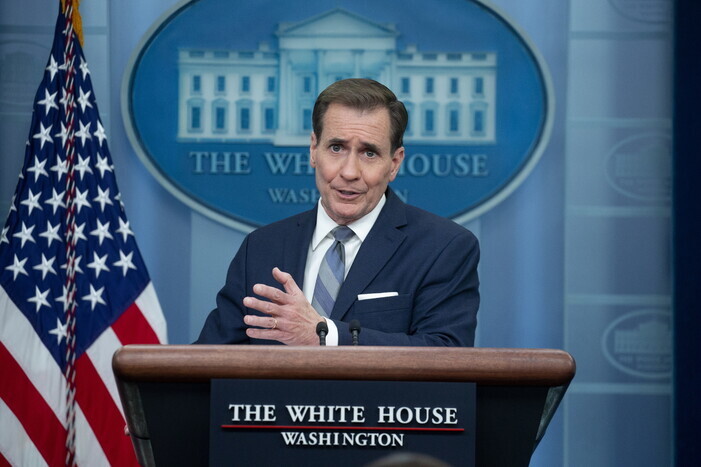hankyoreh
Links to other country sites 다른 나라 사이트 링크
US calls alliance with S. Korea “ironclad” amid allegations of spying on ally

Although the White House has said it is taking the leak of classified intelligence documents seriously and working on getting to the bottom of the situation, it has had very little to say regarding the allegations of targeting the South Korean National Security Office (NSO) with wiretapping. Despite the significant controversy, the US’ only response has been to say that the South Korea-US alliance “remains ironclad.”
Chinese state media has criticized the hypocrisy of the US saying, “When one cockroach is found in the light, there can be a thousand more in the dark,” while Japanese media expressed concerns that this latest incident could negatively affect US foreign policy.
“We’re taking this very, very seriously,” White House National Security Council coordinator for strategic communications John Kirby said at a briefing on Monday (local time) about the leaked documents.
Explaining that President Joe Biden “was first briefed late last week,” Kirby added that the president has remained briefed on the situation and been “in contact with national security officials throughout the weekend.”
It was also revealed that the US Defense Department is leading the investigation of other departments while the Justice Department is investigating the details surrounding the leaks.
“There is no excuse for these kinds of documents to be in the public domain. They don’t deserve to be in the public domain. They deserve to be protected. So we’re going to get to the bottom of this,” Kirby said.
The same day, Chris Meagher, assistant to the secretary of defense for public affairs, told reporters at a briefing that the leaked documents “present a very serious risk to national security and have the potential to spread disinformation.”
Such responses offered by the US State Department, however, failed to address the main issues of concern for South Korea.
Vedant Patel, principal deputy spokesman for the State Department, did not provide any facts or details when asked at a briefing about the CIA allegedly having wiretapped South Korea’s foreign affairs and national security line. Instead, Patel only repeated the standard US answer that “our commitment to the Republic of Korea is ironclad.”
Patel went on to call South Korea “one of our most important partners in the region,” adding that “we have a number of shared values with the Republic of Korea.”
When asked if this incident would affect President Yoon Suk-yeol’s upcoming state visit to the US scheduled for April 26, Patel answered by saying, “We have a very deep relationship and partnership with the Republic of Korea. I know that President Biden and Secretary Blinken and the first lady are looking forward to hosting our South Korean counterparts and partners over the course of the state visit.”
Meanwhile, China’s state-run Global Times outlet wrote in an editorial on Sunday that the root cause of the problem is “South Korea\'s unequal status in its bilateral relations with the US, mirroring Washington\'s deep mistrust and disrespect for South Korea\'s autonomy and rights.”
“When one cockroach is found in the light, there can be a thousand more in the dark,” the editorial stated. “This is not only a matter of the unsightly and dishonorable private morality of the US, but also a significant ‘public matter’ concerning how other countries, including US allies, perceive and deal with the US,” the article continued.
On Tuesday, Japan’s Yomiuri Shimbun also pointed out that countries that were targets of US espionage like South Korea and Israel may see their relations with the US worsen, adding that the sense of crisis in the Biden administration has increased.
By Lee Bon-young, Washington correspondent; Choi Hyun-june, Beijing correspondent; Kim So-youn, Tokyo correspondent
Please direct questions or comments to [english@hani.co.kr]

Editorial・opinion
![[Editorial] Yoon must halt procurement of SM-3 interceptor missiles [Editorial] Yoon must halt procurement of SM-3 interceptor missiles](https://flexible.img.hani.co.kr/flexible/normal/500/300/imgdb/child/2024/0501/17145495551605_1717145495195344.jpg) [Editorial] Yoon must halt procurement of SM-3 interceptor missiles
[Editorial] Yoon must halt procurement of SM-3 interceptor missiles![[Guest essay] Maybe Korea’s rapid population decline is an opportunity, not a crisis [Guest essay] Maybe Korea’s rapid population decline is an opportunity, not a crisis](https://flexible.img.hani.co.kr/flexible/normal/500/300/imgdb/original/2024/0430/9417144634983596.jpg) [Guest essay] Maybe Korea’s rapid population decline is an opportunity, not a crisis
[Guest essay] Maybe Korea’s rapid population decline is an opportunity, not a crisis- [Column] Can Yoon steer diplomacy with Russia, China back on track?
- [Column] Season 2 of special prosecutor probe may be coming to Korea soon
- [Column] Park Geun-hye déjà vu in Yoon Suk-yeol
- [Editorial] New weight of N. Korea’s nuclear threats makes dialogue all the more urgent
- [Guest essay] The real reason Korea’s new right wants to dub Rhee a founding father
- [Column] ‘Choson’: Is it time we start referring to N. Korea in its own terms?
- [Editorial] Japan’s rewriting of history with Korea has gone too far
- [Column] The president’s questionable capacity for dialogue
Most viewed articles
- 1Months and months of overdue wages are pushing migrant workers in Korea into debt
- 2Trump asks why US would defend Korea, hints at hiking Seoul’s defense cost burden
- 3[Editorial] Yoon must halt procurement of SM-3 interceptor missiles
- 4At heart of West’s handwringing over Chinese ‘overcapacity,’ a battle to lead key future industries
- 5[Guest essay] Maybe Korea’s rapid population decline is an opportunity, not a crisis
- 61 in 3 S. Korean security experts support nuclear armament, CSIS finds
- 7Fruitless Yoon-Lee summit inflames partisan tensions in Korea
- 8First meeting between Yoon, Lee in 2 years ends without compromise or agreement
- 9Under conservative chief, Korea’s TRC brands teenage wartime massacre victims as traitors
- 10[Column] Park Geun-hye déjà vu in Yoon Suk-yeol